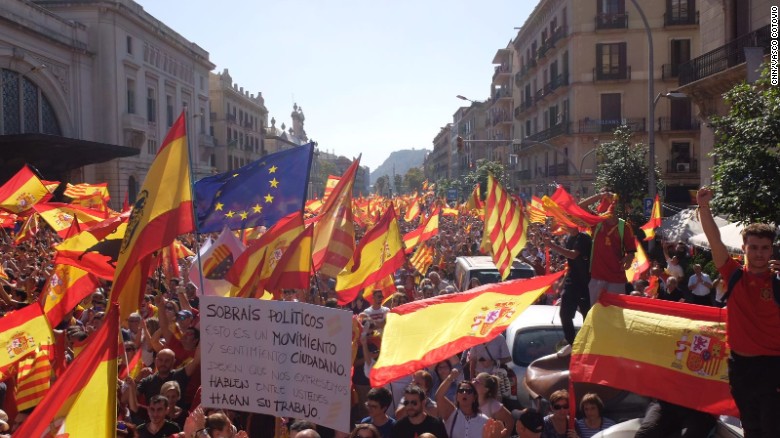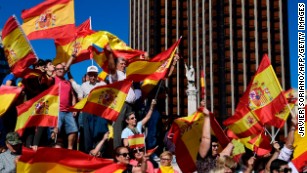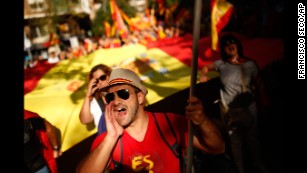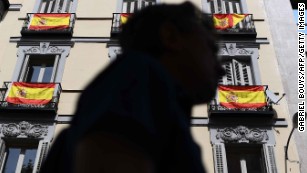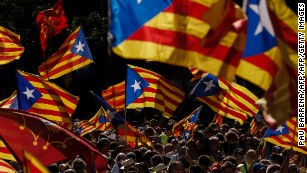Catalonia: Spaniards wake up to a week of uncertainty
(CNN)Spaniards woke up Monday facing a week of political uncertainty, with Catalan regional leader Carles Puigdemont expected to declare independence from Spain within a matter of days.
Puigdemont, the elected regional president of Catalonia and leader of its secessionist movement, vowed to make the declaration following a divisive and controversial referendum on October 1, that he said was the resounding voice of the people. Madrid maintains that the vote was carried out illegally and the result is invalid.
The standoff between Madrid and Barcelona has plunged Spain into its most serious political crisis in four decades, since the country transitioned to democracy.
PROFILE: Catalan president has 'independence at his core'
Spain's Prime Minister Mariano Rajoy vowed on Saturday to use every tool within the law to stop any meaningful declaration of independence, including a never-before-used clause in the Spanish Constitution to suspend Catalonia's autonomy.
"We are going to stop independence from happening. On that, I can tell you with absolute frankness, that it will not happen. It is evident that we will take whatever decision that we are permitted to by law, in view of how things are unfolding," Rajoy told the El Pais newspaper in an interview.
"The ideal scenario would be that there were no need for drastic solutions, but for that there would need to be rectifications."
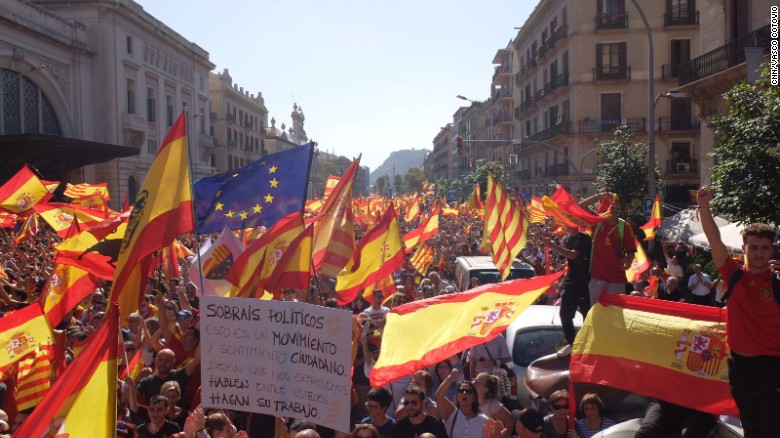
Protesters wave Spanish, Catalan and European Union flags in a call for unity on October 8, 2017, in Barcelona, Spain.
Catalan parliament to meet Tuesday
Spain's Constitutional Court last week suspended a session of the Catalan Parliament's scheduled for Monday following a request by the Catalan Socialist Party, which opposes secession.
Members of Puidgemont's Popular Unity Candidacy party (CUP) had threatened to meet in Parliament on Monday anyway, in an act of defiance, but it is unclear if they will.
Spanish leader Rajoy mulls suspending Catalonia autonomy
A Catalan Parliament spokesperson told CNN that a new session had been called for Tuesday at 6 p.m. (12:00 p.m. ET), in which Puigdemont is expected to update members on the "current political situation."
The address could be the moment when Catalonia's leader declares that the region will break away.
"Many people believe -- and he seems to be moving in that direction -- that he will use this opportunity to declare, or to announce the results of the referendum which, as far as he was concerned, were overwhelmingly in favor of independence," Dominic Thomas, chair of the department of French and Francophone Studies, University of California Los Angeles, told CNN.
Whatever happens this week, it's clear that there are deep divisions over the issue, not only between Madrid and Barcelona, but within Catalonia as well.
'Catalonia is Spain': Protests snub call for Catalan independence
On Sunday, protesters marched in Barcelona in support of remaining part of Spain, arguing there was no reason they couldn't be both Catalan and Spanish.
But protesters have also marched in favor of independence since the October 1 vote, claiming that the Catalan have a distinct culture from the rest of Spain and that they contribute more to the economy than the other regions.
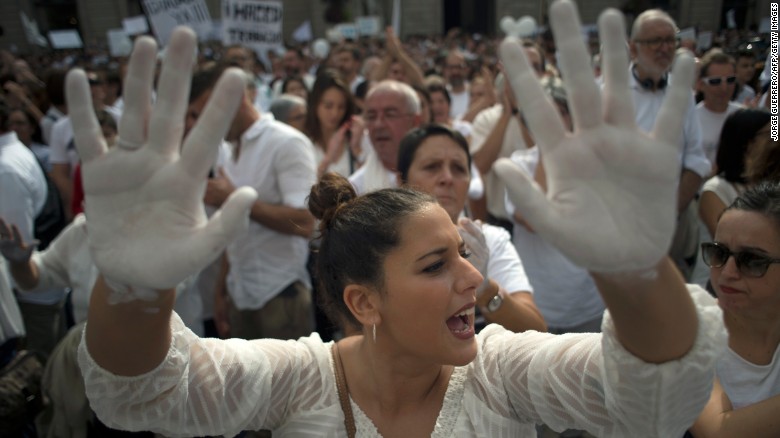
A woman takes part in the "Let's Talk" protest in Barcelona to call for dialogue, on October 7, 2017.
Thomas says that the "powerful" show of support for unity means that a declaration of independence may not be well received.
"Many people stayed home and didn't vote (Sunday) so the whole question of the mandate that he would have in speaking before that parliament and declaring independence would be challenged.
"The turnout in Barcelona and across Spain to talk about Spain and unity and to express the voice of those who would not want this referendum to go ahead was also overwhelmingly powerful."
'No turning back'
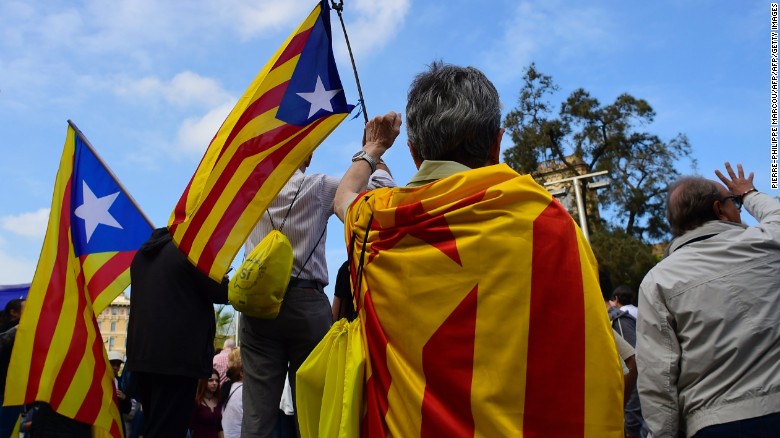
People wave Catalan pro-independence "Estelada" flags in Barcelona, on October 2, 2017.
Catalonia is the country's wealthiest and most productive region, qualities that have already given the Catalan people the leverage to negotiate sweeping powers and an status of autonomy within Spain.
Pilar, a pensioner who gave only her first name, told CNN in Barcelona that she was nervous about what this week might bring.
"If that happens I will leave Catalonia," she said.
The division took a particularly brutal form on the day of the vote, when Spanish police sent into Catalonia by the thousands clashed with protesters and voters in an attempt to shut the referendum down.
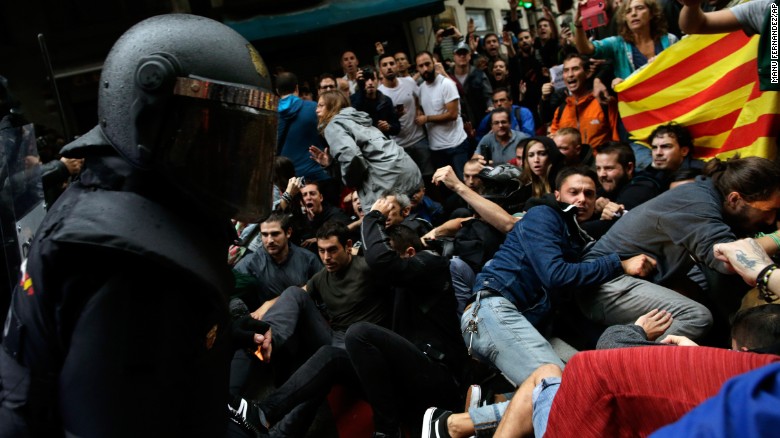
Spanish National Police clash with pro-independence supporters in Barcelona on October 1, 2017, the day of the vote.
Images of police firing rubber bullets, restraining elderly people and pulling voters from polling booths by the hair have shocked people around the world. Hundreds were injured.
Despite the outrage, Rajoy and even Spanish King Felipe VI, defended the police and doubled down on their stance to take whatever measures necessary to keep Catalonia from seceding.
Rajoy was forced to apologize on Friday, but many in Catalan say the crackdown has only fueled their desire for independence.
"I didn't feel that repressed until what happened on October 1," 25-year-old student Mireya Jimenez told CNN
"I think that whatever they do, they have made us angry, and I think we have seen that a ... part of Spain doesn't like us -- the King doesn't like us either and so I think that, also because of how they've treated us just now, there is no turning back."
What's at stake?
There are wide implications for both Spain and Europe if Catalonia declares and achieves independence.
The Catalans who oppose a split from Spain
Catalonia accounts for nearly a fifth of Spain's economy, and leads all regions in producing 25% of the country's exports, CNN Money reports.
It contributes much more in taxes (21% of the country's total) than it gets back from the government.
And there is more at stake for Madrid than losing wealth. The country has 17 regions with varying degrees of autonomy, and losing one may inspire others to begin, or revive, separatist movements.
But there are many other unanswered questions, including continued membership in the European Union.
Catalan independence supporters see brighter future alone
If Catalonia was forced to independently apply for EU membership, it would have to convince all of the bloc's current members to agree, including Spain.
Splitting from Spain would also likely mean a reduction in funds Spain can pay to the EU.
And if Catalonia became an independent state, it would not automatically be a World Trade Organization member, so would likely face stiff trade barriers that would hurt its economy.
Journalist Elena Gyldenkerne and CNN's Vasco Cotovio contributed to this report from Barcelona.
News Courtesy: www.cnn.com

